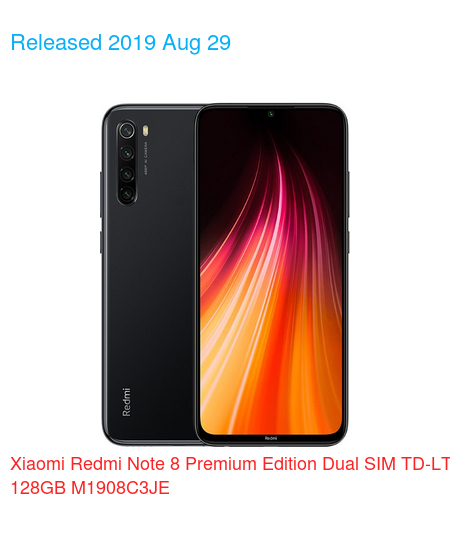| Brand | Xiaomi |
| Model | Redmi Note 8 Premium Edition Dual SIM TD-LTE CN 128GB M1908C3JE |
| Released | 2019 Aug 29 |
| Announced | 2019 Aug 21 |
| Hardware Designer | Xiaomi |
| Manufacturer | Foxconn |
| Codename | Xiaomi Ginkgo |
| General Extras | Haptic touch feedback |
| Device Category | Smartphone |
| Width | 75.3 mm |
| Height | 158.3 mm |
| Depth | 8.35 mm |
| Dimensions | 2.96×6.23×0.33 inches |
| Mass | 190 g |
| Platform | Android |
| Operating System | Google Android 9.0 (Pie) |
| Software Extras | Voice Command , Navigation software , Augmented Reality (AR) , Intelligent personal assistant , Face Recognition |
| CPU Clock | 2000 MHz |
| CPU | Qualcomm Snapdragon 665 SM6125 (Trinket), 2019, 64 bit, octa-core, 11 nm, Qualcomm Adreno 610 GPU |
| RAM Type | LPDDR4x SDRAM |
| RAM Capacity (converted) | 6 GiB RAM |
| Non-volatile Memory Interface | Yes |
| Non-volatile Memory Capacity (converted) | 128 GB ROM |
| Display Notch | 1-notch |
| Display Diagonal | 160 mm |
| Resolution | 1080×2340 |
| Horizontal Full Bezel Width | 8.25 mm |
| Display Area Utilization | 81.7% |
| Pixel Density | 409 PPI |
| Display Type | Color IPS TFT LCD display |
| Number of Display Scales | 16.8M |
| Scratch Resistant Screen | Gorilla Glass 5 |
| Graphical Controller | Qualcomm Adreno 610 |
| A/V Out | No |
| Microphone(s) | stereo |
| Loudspeaker(s): | mono |
| Audio Output: | 3.5mm |
| Supported Cellular Bands | GSM850 , GSM900 , GSM1800 , GSM1900 , UMTS2100 (B1) , UMTS850 (B5) , UMTS900 (B8) , CDMA800 (BC0) , TD-SCDMA2000 , TD-SCDMA1900 , LTE2100 (B1) , LTE1800 (B3) , LTE850 (B5) , LTE900 (B8) , TD-LTE2000 (B34) , TD-LTE2600 (B38) , TD-LTE1900 (B39) , TD-LTE2300 (B40) , TD-LTE2500 (B41) bands |
| Supported Cellular Data Links | GPRS , EDGE , UMTS , HSUPA , HSUPA 5.8 , HSDPA , HSPA+ 21.1 , HSPA+ 42.2 , DC-HSDPA 42.2 , cdmaOne , CDMA2000 1x , CDMA2000 1xEV-DO , CDMA2000 1xEV-DO Rev A , TD-SCDMA , TD-HSDPA , LTE , LTE 100/50 , LTE 150/50 , LTE 300/50 , LTE 600/50 data links |
| SIM Card Slot | Nano-SIM (4FF) |
| Complementary Phone Services | Voice transmission , Voice speaker , Vibrate , Speakerphone , ANC , HD Voice , VoLTE |
| Dual Cellular Network Operation | Dual standby |
| Sec. Supported Cellular Networks: | GSM850 , GSM900 , GSM1800 , GSM1900 , UMTS2100 (B1) , UMTS850 (B5) , UMTS900 (B8) , CDMA800 (BC0) , TD-SCDMA2000 , TD-SCDMA1900 , LTE2100 (B1) , LTE1800 (B3) , LTE850 (B5) , LTE900 (B8) , TD-LTE2000 (B34) , TD-LTE2600 (B38) , TD-LTE1900 (B39) , TD-LTE2300 (B40) , TD-LTE2500 (B41) |
| Sec. Supported Cellular Data Links: | GPRS , EDGE , UMTS , HSUPA , HSUPA 5.8 , HSDPA , HSPA+ 42.2 , DC-HSDPA 42.2 , cdmaOne , CDMA2000 1x , CDMA2000 1xEV-DO , CDMA2000 1xEV-DO Rev A , LTE , LTE 100/50 , LTE 150/50 , LTE 300/50 , LTE 600/50 |
| Sec. SIM Card Slot | Nano-SIM (4FF) |
| Touchscreen Type | Capacitive multi-touch screen |
| Expansion Interfaces | No |
| USB | USB 2.0 |
| USB Services | USB charging , USB fast charging , USB Host , USB OTG 1.3 , USB OTG 2.0 , USB PD |
| USB Connector | USB C reversible |
| Max. Charging Power | 18.0 W |
| Bluetooth | Bluetooth 4.2 |
| Wireless LAN | 802.11a , 802.11b , 802.11g , 802.11n , 802.11ac |
| Wireless Services | Wi-Fi Direct , Wi-Fi Tethering , WiDi , Wi-Fi Calling |
| FM Radio Receiver | FM radio (76-108 MHz) with RDS |
| Complementary Satellite Services | Simultaneous GPS , A-GPS , Dual-frequency GPS , Geotagging , QuickGPS , QZSS |
| Supported GLONASS protocol(s) | L1OF |
| Supported Galileo service(s) | E1 |
| Supported BeiDou system (BDS) | B1I BeiDou receiver |
| Camera Placement | Rear |
| Camera Image Sensor | BSI CMOS |
| Image Sensor Pixel Size | 0.80 micrometer |
| Number of effective pixels | 48.0 MP camera |
| Aperture (W) | f/1.79 |
| Zoom | 1.0 x optical zoom |
| Focus | PD AF |
| Video Recording | 3840×2160 pixel |
| Flash | single LED |
| Camera Extra Functions | EIS , EIS (video) , Pixel unification , HDR photo , HDR video , Red-eye reduction , Slow motion video , Burst mode , Refocus , Touch focus , Panorama Photo , Face detection , Face tagging , Smile detection , Face retouch , Face retouch (video) , Intelligent scene detection |
| Aux. Camera Image Sensor | BSI CMOS |
| Aux. Cam. Image Sensor Pixel Size | 1.12 micrometer |
| Aux. Camera Number of Pixels | 8.0 MP aux. cam |
| Aux. Camera Aperture (W) | f/2.20 |
| Aux. Camera Focus | PD AF |
| Aux. Camera Extra Functions | HDR photo , HDR video , Burst mode , Refocus , Touch focus , Panorama Photo , Face detection , Face tagging , Smile detection , Face retouch , Face retouch (video) , Intelligent scene detection |
| Aux. 2 Camera Image Sensor | CMOS |
| Aux. 2 Camera Number of Pixels | 1.9 MP aux. 2 cam |
| Aux. 2 Camera Aperture (W) | f/2.40 |
| Aux. 3 Camera Image Sensor | Mono CMOS |
| Aux. 3 Camera Number of Pixels | 1.9 MP aux. 3 cam |
| Aux. 3 Camera Aperture (W) | f/2.40 |
| Aux. 4 Camera Image Sensor | No |
| Secondary Camera Placement | Front |
| Secondary Camera Sensor | BSI CMOS |
| Secondary Camera Number of pixels | 13.0 MP sec. cam |
| Secondary Aperture (W) | f/2.00 |
| Secondary Video Recording | 1920×1080 pixel |
| Secondary Camera Extra Functions | Pixel unification , HDR photo , HDR video , Burst mode , Panorama Photo , Face detection , Face tagging , Smile detection , Face retouch , Face retouch (video) , Intelligent scene detection |
| Sec. Aux. Cam. Image Sensor | No |
| Built-in compass | Yes |
| Built-in accelerometer | 3D accelerometer |
| Built-in gyroscope | 3D gyro |
| Additional sensors | FP sensor , L sensor , P sensor |
| Protection from solid materials | Yes |
| Protection from liquids | Yes |
| Battery | Li-ion polymer (LiPo) |
| Nominal Battery Capacity | 4000 mAh battery |
| Market Countries | China |
| Market Regions | Asia |
| Mobile Operator | China Mobile Limited China Telecom Corporation Limited China Unicom Netcom Limited |
| Added | 2024-06-15 |
Specifications data description of this 📱Xiaomi Redmi Note 8 Premium Edition Dual SIM TD-LTE CN 128GB M1908C3JE📱
Title: Specification of the Device: A Comprehensive Overview
Introduction:
Welcome to our latest blog post, where we take a deep dive into the specification of a new and exciting device. Whether you’re a tech enthusiast or someone looking to buy a new gadget, this post is for you. Today, we’ll be exploring the various aspects of the device, including its network capabilities, design, specifications, and more. So, let’s get started!
Lineup:
Before we dive into the specifications of the device, let’s take a look at the lineup. This device is part of a larger family of products, each with its unique features and capabilities. However, the device we’ll be focusing on today stands out for its powerful performance and sleek design.
Design:
Speaking of design, let’s take a closer look at the device itself. The device boasts a slim and lightweight design, making it perfect for on-the-go use. The device’s display is also worth mentioning, with a crisp and vibrant 🌈 DISPLAY that brings your content to life.
Specifications:
Now, let’s get into the nitty-gritty of the device’s specifications.
🌐 Network:
The device supports 4G LTE, allowing you to stay connected no matter where you are.
📅 LAUNCH:
The device was launched in [insert date].
🏋️ Body:
The device weighs in at [insert weight] and has dimensions of [insert dimensions].
🤖 OS:
The device runs on [insert operating system].
🛠️ Chipset:
It is powered by a [insert chipset] chipset.
🚀 CPU:
The CPU is a [insert CPU].
🖥️ GPU:
The device features a [insert GPU].
🧠 MEMORY:
It has [insert memory] of memory.
📷 CAMERA:
The device’s camera is a [insert camera], capable of capturing stunning photos and videos.
🎥:
The camera also supports [insert camera features].
🔈 SOUND:
The device’s sound system features [insert sound features].
📡 COMMS:
In terms of connectivity, the device supports [insert connectivity features].
💡 FEATURES:
Other notable features of the device include [insert features].
📶:
The device also supports [insert wireless charging features].
🔋 BATTERY🔌:
The device’s battery life is [insert battery life], giving you plenty of power for all-day use.
Conclusion:
And there you have it – a comprehensive overview of the device’s specifications. We hope you’ve found this post informative and helpful. If you have any questions or comments, we invite you to leave them below. We’d love to hear from you!
Thank you for reading, and stay tuned for more exciting content from us.
Note: The placeholders (e.g., [insert weight]) listed in the specifications section should be replaced with the actual specifications of the device being described.














